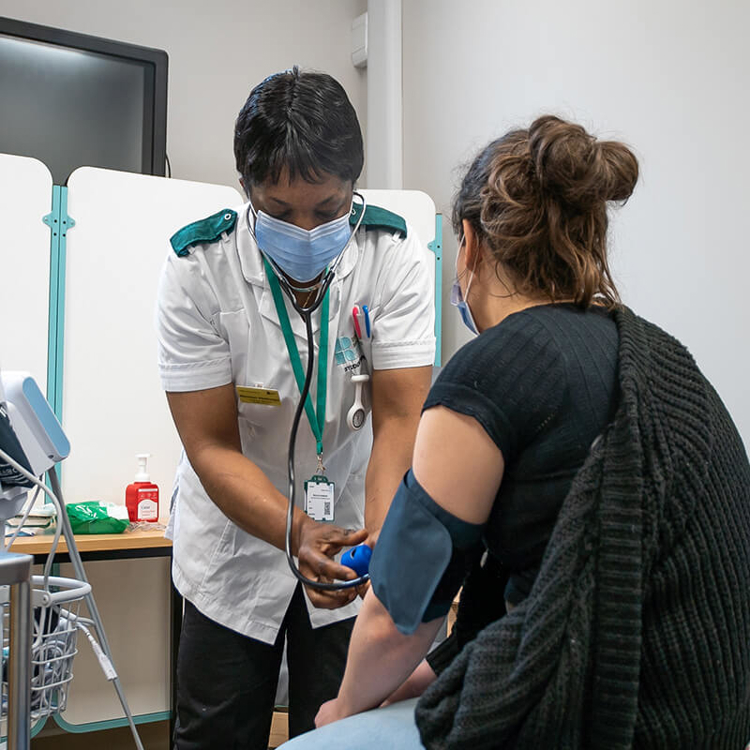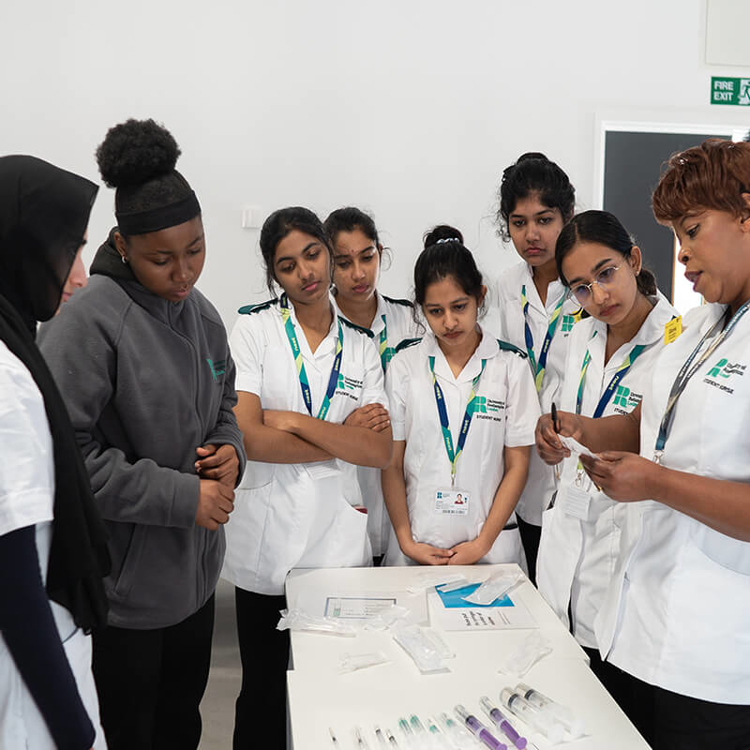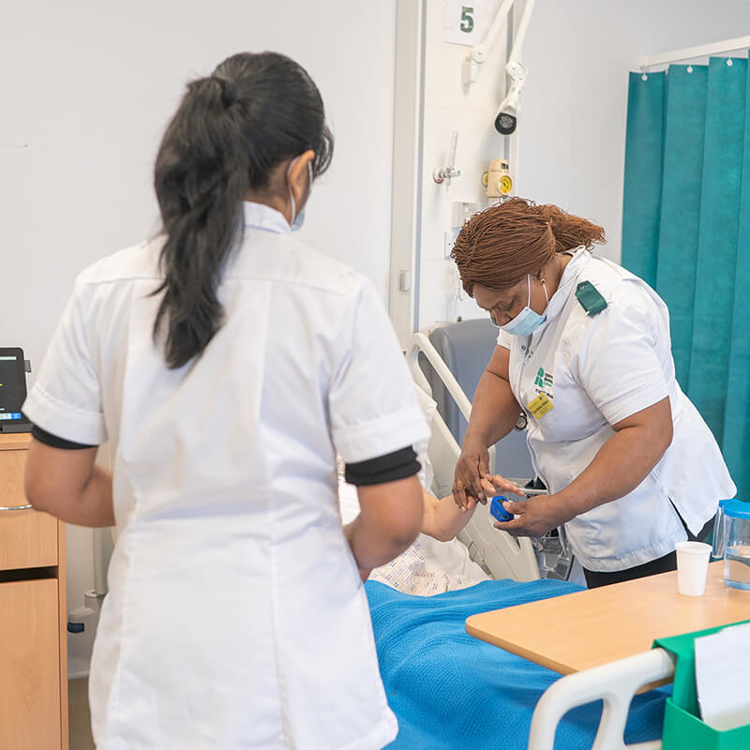/ Foundation /
Start date:
September 2025
Entry tariff:
48–64 UCAS points (or equivalent)
UCAS code:
TBC

Our Health and Social Care Foundation Studies: Certificate of Higher Education is a one year course that will give you the skills and confidence you need for a profession, job or academic study in health and social care.
Did you know
You'll learn in an exciting environment that champions individuality, encourages collaboration and supports you every step of the way.
Once you complete the course, you can progress onto studying a degree.
Top 3 modern university in London
(Complete University Guide 2025)

Ranked in the top 15% in the world
Times Higher Education Young University Rankings 2024

#8 in England for undergraduate student satisfaction
National Student Survey 2024

Modules
30 credits
You will develop your core academic and integrated English language skills of speaking, listening, reading and writing. You will become familiar with key academic skills and concepts, such as referencing methods and awareness of academic integrity and tone. You will apply these skills and knowledge to both broad topics and also your chosen subject pathway.
Teaching and learning
You will be required to actively engage in on-campus learning for up to 10 hours a week.
You will be taught through a full range of teaching and learning methods, which include lectures, seminars, workshops, discussion groups, group directed tasks and presentations. This will enable you to learn from your peers and tutors in both structured and information settings.
You will be encouraged to think creatively about your approach to learning and discussions with your peers. You will also have access to recordings, resources, links and signposting through Moodle to enrich your learning.
Assessment
You will be assessed through group and individual presentations, comparative and reflective essays, multiple choice exams, coursework and reports, oral exams, portfolios, case studies and blogs.
30 credits
You will develop your research, numeracy and information technology skills. You will investigate the difference between primary and secondary research, conduct your own research project and demonstrate your findings through data analysis. You will also develop your awareness of equality, diversion and inclusion in the UK, through a real-world issue; discrimination in the workplace.
Teaching and learning
You will be required to actively engage in on-campus learning for up to 10 hours a week.
You will be taught through a full range of teaching and learning methods, which include lectures, seminars, workshops, discussion groups, group directed tasks and presentations. This will enable you to learn from your peers and tutors in both structured and information settings.
You will be encouraged to think creatively about your approach to learning and discussions with your peers. You will also have access to recordings, resources, links and signposting through Moodle to enrich your learning.
Assessment
You will be assessed through group and individual presentations, comparative and reflective essays, multiple choice exams, coursework and reports, oral exams, portfolios, case studies and blogs.
30 credits
This module offers an engaging introduction to the essential principles and structures that underpin health and social care systems.
It invites you to explore the dynamic relationship between health, wellbeing, and social care, encouraging a deeper understanding of how these concepts are shaped by social, economic, and political influences.
Throughout the module, you will gain insights into how the healthcare and social care systems in the UK operate, including their funding, policies, and the interconnected roles of professionals within these sectors. You will examine the sociological, psychological, and biological factors that influence health outcomes and care delivery, while also exploring the importance of working collaboratively within multidisciplinary teams to provide integrated, patient-centered care.
As the module progresses, you will delve into the changing healthcare needs across different life stages, from childhood to old age, and consider the challenges of supporting individuals with long-term conditions. You will also be introduced to the principles of behaviour change, helping you understand how to encourage healthier lifestyle choices and improve well-being in various contexts.
Teaching and learning
Through practical workshops, discussions, and case studies, this module is designed to help you apply your knowledge to real-world scenarios. By the end of the module, you will have developed a solid foundation in health and social care, equipping you with the critical thinking skills and practical understanding necessary for further study or professional practice in this field.
The teaching delivery for each module consists of one, one-three-hour lecture and one, two-hour workshop per week. Lectures will cover core indicative content, while seminars consist of research workshops, small group learning on relevant case studies, and role-play scenarios using specialist nursing facilities.
You will also have an additional 30 minutes of online support each week. This will consist of formal preparation/review of practical sessions, as well as cross-related activities with other groups.
Assessment
This module will be assessed using an informative poster and a case study report.
30% - information poster, you will design an informative poster that clearly outlines and compares the key differences between health and social care provision in England/UK.
70% - case study report, you will be required to write a detailed case study report analysing the healthcare and social care needs of an individual or group across a specific life stage.
30 credits
This module focuses on equipping you with the foundational knowledge, skills, and attitudes essential for personal and professional growth within health and social care settings. It provides an in-depth exploration of key concepts such as professionalism, ethical practice, teamwork, and effective communication, alongside fostering self-awareness and resilience in professional roles.
You will engage with a range of topics, including the role of professional regulation, the impact of national and local policies, and the application of reflective practice to enhance personal development. Legal and ethical principles are examined to ensure safe and accountable practice, while issues such as safeguarding, equality, diversity, and anti-discriminatory practice highlight the importance of inclusive care.
A significant focus is placed on understanding and managing personal vulnerabilities, building resilience, and practicing self-care to maintain wellbeing. Through interactive learning activities, you will develop critical communication and collaboration skills, essential for working effectively within multidisciplinary teams. By the end of the module, you will have a strong foundation for ethical and professional practice, with the ability to apply these principles in diverse care settings.
Teaching and learning
The teaching delivery for each module consists of one, one-three-hour lecture and one, two-hour seminars per week. Lectures will cover core indicative content, while seminars will consist of research workshops, small group learning on relevant case studies, and role-play scenarios using specialist nursing facilities.
You will also have an additional 30 minutes of online support each week. This will consist of formal preparation/review of practical sessions and reflection on learning, as well as cross-related activities with other groups and presentation preparation.
Assessment
This module will be assessed using an individual presentation and a reflective journal.
50% - individual presentation, you will be required to develop and deliver a presentation proposing an alternative public health campaign aimed at addressing a specific health or social care issue.
70% - reflective journal, you will be required to produce a reflective journal across the semester, that critically examines your understanding of professionalism and ethical practice in health and social care.
These modules are those we currently offer and may be subject to change.

Skills
Gain the skills that matter most to employers.
You’ll gain a basic understanding of using English for academic purposes and a thorough grounding in academic study skills, such as essay structure, exam technique, referencing, journal and library research.
You will learn about the history and the contemporary context of health and social care and its relationship with health outcomes and wellbeing for individuals, families and communities.
You will be introduced to the professional responsibilities of those working within health and social care and look at the relevant professional frameworks, codes of practice, ethical concepts and legislation and explore the concepts of equality and diversity, and inclusion.
Learning
You’ll be taught via lectures, seminars and workshops by our passionate and committed academic staff.
You will explore the importance of effective teamwork and communication in health and social care.
As our courses are taught over no more than three days per week, you’ll have the flexibility to take on paid part-time work, placements, or internships – helping you gaining real-world experience.


Assessment
Benefit from assessments that prepare you for life beyond university.
You’ll experience a wide range of assessments that enhance your understanding, explore ideas in depth and express your creativity.
This includes:
- Coursework
- Reports
- Essays
Career
We will prepare you for your career from day one.
Our Health and Social Care Foundation Studies: Certificate of Higher Education will give you the specific skills and confidence you need for a profession in health and social care or to prepare you for studying your undergraduate degree with us.
To progress onto the first year of a nursing undergraduate course, you will need to apply during your study.
Our career support team is available to support you from the start of your studies. They will help you build your CV, prepare for interviews, and meet and learn from successful graduates working at the top of their careers.

Open days
Get a real taste of our campus, community and what it’s like to study at Roehampton
Applying
Full-time UK undergraduate students apply through UCAS.
Entry tariff
48–64 UCAS points (or equivalent)
Looking to work out your UCAS points or find out about our entry requirements? Find out more.
When we consider applications to study with us, we form a complete view of your achievements to date, and future potential, and can offer flexibility in entry requirements. Find out more about our Contextual Offer scheme.
General entry requirements
September 2025 entry tuition fees (UK)
Foundation Studies: Certificate of Higher Education: £9,535




